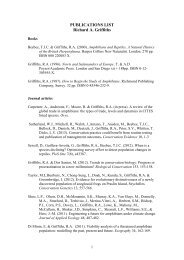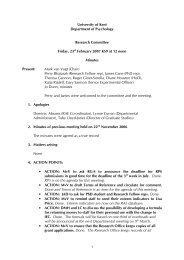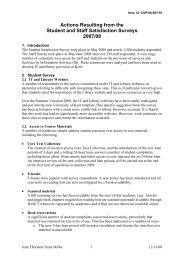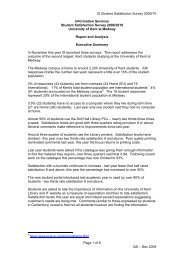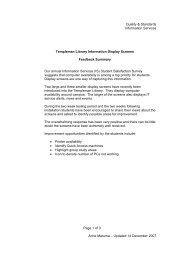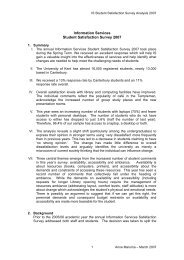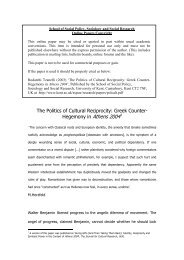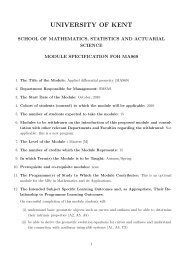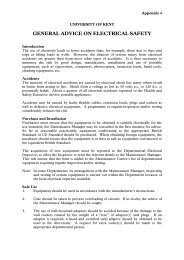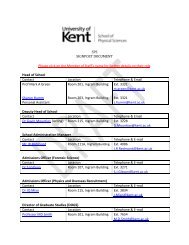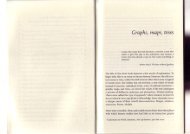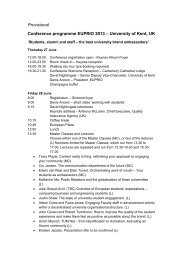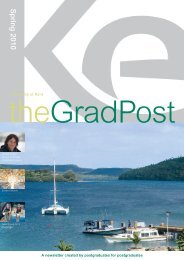Download - University of Kent
Download - University of Kent
Download - University of Kent
Create successful ePaper yourself
Turn your PDF publications into a flip-book with our unique Google optimized e-Paper software.
STUDENT PROFILE<br />
<strong>University</strong> <strong>of</strong> <strong>Kent</strong> / ARTS STUDIO<br />
SUE HOWELL<br />
Sue Howell graduated from <strong>Kent</strong>’s Drama and Theatre<br />
Studies degree. Here, she tells us how her studies led to a<br />
dream job at the National Theatre in London.<br />
Why did you choose this programme?<br />
From a young age, I took part in performing arts,<br />
studying various forms <strong>of</strong> dance and taking both<br />
acting and singing classes before choosing to<br />
study performing arts at college. It was at college<br />
that I gained a deeper interest in theatre; as well<br />
as performing, we studied other aspects <strong>of</strong> the<br />
industry such as budgets and finance, community<br />
work and technical theatre. I was attracted by this<br />
diversity and, with a lot <strong>of</strong> help from my tutors at<br />
college, I looked into several drama and theatre<br />
studies courses. I chose the four-year programme<br />
at <strong>Kent</strong> because it seemed to <strong>of</strong>fer everything I<br />
wanted, and the best prospects for me in the long<br />
run.<br />
Did your course live up to your<br />
expectations?<br />
The course <strong>of</strong>fers a fair amount <strong>of</strong> flexibility and<br />
gives you the chance to explore your interests<br />
and passions. I revelled in being able to study<br />
<strong>of</strong>ten opposing theatre genres at the same time<br />
and being given the freedom and encouragement<br />
to bring knowledge and experience from one to<br />
inform the other. I discovered plays and whole<br />
classifications <strong>of</strong> theatre that I didn’t know existed.<br />
This was a great inspiration to me and I feel that<br />
this exploration allowed me to discover my<br />
passion for the area I now work in. I was<br />
particularly inspired by modules covering<br />
multimedia and theatre, and scenography.<br />
How would you describe the teaching at<br />
<strong>Kent</strong>?<br />
The level <strong>of</strong> teaching within the Drama<br />
Department is <strong>of</strong> a high standard, with many <strong>of</strong><br />
the lecturers being active practitioners<br />
themselves. I felt this brought a different<br />
perspective to the teaching and guidance that<br />
they were able to <strong>of</strong>fer. There were several<br />
lecturers at <strong>Kent</strong> who not only inspired me, but<br />
also encouraged and guided me through my time<br />
at university. They made my experience<br />
enjoyable and helped me get to where I am in my<br />
career. For example, my multimedia lecturer<br />
Rosie Klich opened my eyes to some amazing<br />
performances and ideas, and Gary McCann<br />
allowed me to incorporate my passion for lighting<br />
into my design work and also helped me to get<br />
my placement at the National Theatre, which led<br />
to my current employment.<br />
Bruno Poet<br />
I also owe a lot to the wonderful drama technicians<br />
at <strong>Kent</strong> – Ian Baird, Scott Miller and Sam<br />
Westbury – who took the time to help me develop<br />
my skills. With their help, I built up skills and a love<br />
<strong>of</strong> the technical side <strong>of</strong> the theatre that I guess has<br />
led to my career choice.<br />
What did you gain from your studies?<br />
I feel my course, especially my final specialism<br />
year, helped me to develop my abilities to organise<br />
and push myself to achieve my potential. I think it<br />
also gave me a good basis for working within the<br />
theatre industry. I have a good general knowledge<br />
<strong>of</strong> not only genres, but also practitioners and<br />
process.<br />
When did you first think about becoming a<br />
pr<strong>of</strong>essional technician?<br />
I initially discovered lighting at college but my love<br />
<strong>of</strong> technical theatre definitely developed over my<br />
time at <strong>Kent</strong> – I was able to look further into how<br />
influential and integral technical aspects <strong>of</strong> the<br />
theatre really are to a performance, so becoming a<br />
technician felt like a natural progression <strong>of</strong> this<br />
development.<br />
How did you find your job at the National<br />
Theatre?<br />
As I said, I did a three-week placement working<br />
across the three different theatres that make up the<br />
National Theatre. After this experience, I was<br />
contacted by the technical manager <strong>of</strong> the Olivier<br />
Theatre and asked to work on Hamlet for a month; I<br />
have been here ever since. I have been lucky<br />
enough to be involved in productions such as the<br />
Broadway transfer Fela! and Danny Boyle’s new<br />
production <strong>of</strong> Frankenstein. I feel incredibly fortunate<br />
to have the job I do now but I’d like to think it shows<br />
how important it is to gain work experience and get<br />
your name and face out there. It has definitely<br />
taught me how important that is in this industry!<br />
What advice would you give to prospective<br />
students?<br />
The only advice I would give prospective students is<br />
to strive for whatever it is that they are passionate<br />
about. At <strong>Kent</strong> I found it possible to do that. It had a<br />
good environment and good facilities, but most<br />
importantly the staff were supportive, encouraging<br />
and passionate about theatre. And if you don’t know<br />
what you want to do, this course can help you<br />
explore yourself and your passions.<br />
37



